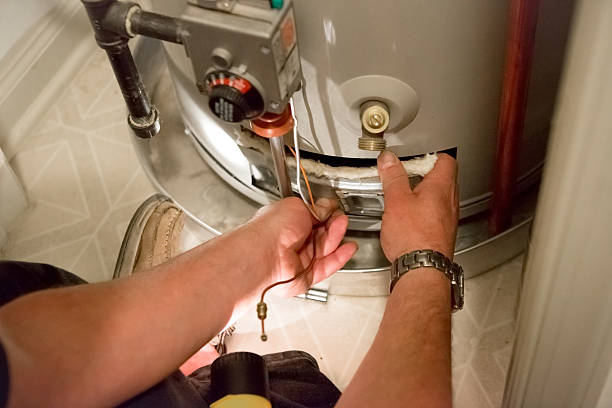
Water heaters are essential to every household, especially during cold weather. They keep our water warm, allowing us to take showers, wash dishes, and do our laundry with ease. However, when your water heater starts making strange noises, it can be a cause for concern. Not only is it annoying, but it can also indicate that something is wrong with your system. To help homeowners, Suburban Plumbing Experts is here to share their knowledge on the common noises a water heater makes, what they mean, and when you might need to call in a professional.
Why is my Water Heater Making Strange Noises?
There are several reasons why a water heater might make strange noises. The most common ones include:
Sediment Build-up
Over time, sediment and minerals can build up at the bottom of your water heater tank. When the water heats up, it can cause the sediment to move around, creating a loud banging or rumbling noise. This is a sign that it’s time to flush your water heater and remove the sediment.
Lime Scale Build-up
If you live in an area with hard water, lime scale can build up on the heating elements of your water heater. This can cause a popping or ticking noise. If the lime scale isn’t cleaned, it can cause the heating elements to overheat and fail.
Water Hammer
Water hammer is a loud banging noise that happens when the water flow inside your pipes suddenly changes. It’s caused by the water stopping abruptly, creating a shockwave that travels through the pipes and shakes them. Water hammer can cause damage to your pipes and fittings, so it’s important to address it quickly.
Loose Heating Element
If your water heater is making a rattling noise, it could be due to a loose heating element. As the water heats up, the element can vibrate and move around, causing the sound. If left unaddressed, the element can become damaged and require replacement.
Faulty Pressure Relief Valve
The pressure relief valve on your water heater is designed to release excess pressure if it builds up inside the tank. If the valve becomes faulty, it can cause a hissing or whistling noise. It’s important to replace a faulty pressure relief valve as soon as possible, as it can lead to a dangerous pressure build-up inside the tank, causing it to burst.

When Should I Contact a Professional?
If your water heater is making strange noises, it’s best to contact a plumber near you to diagnose the issue. Some noises can be fixed with basic maintenance, such as flushing the tank or cleaning the heating elements. However, other issues require professional expertise, especially if your water heater is old or has other underlying issues.
A good residential plumber will have the knowledge and expertise to diagnose the issue and recommend the best course of action. They can also advise you on whether it’s time to replace your water heater, based on the age, condition, and efficiency of your current system.
Preventive Measures to Avoid Strange Noises in Water Heaters
Here are some preventive measures that can help you avoid strange noises in your water heater:
Regular Maintenance
One of the best ways to avoid strange noises in your water heater is by performing regular maintenance, including flushing the tank, checking the heating elements, and inspecting the pressure relief valve. This keeps your water heater running smoothly and can help reduce sediment and mineral build-up.
Water Softener
If you live in an area with hard water, consider installing a water softener. This can help reduce the mineral build-up inside your water heater and help prevent lime scale from forming on your heating elements.
Expansion Tank
If you have high water pressure in your home, consider installing an expansion tank. This helps reduce the pressure build-up in your water heater tank and can prevent the pressure relief valve from releasing excess pressure.
Replace Old or Inefficient Systems
If your water heater is old or inefficient, consider replacing it with a newer, energy-efficient model. This not only helps reduce strange noises but also helps save energy and lower your utility bills.
In Conclusion
Strange noises from your water heater can be a cause for concern, but they can also be a sign of easily fixable problems. By performing regular maintenance, installing a water softener, and contacting a professional when needed, you can keep your water heater running smoothly and avoid costly repairs.

